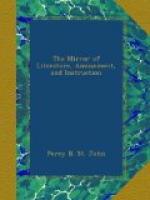* * * * *
SONG.
TUNE,—“Love was once a Little Boy.”
(For the Mirror.)
Beauty once was but a girl—
Heigho!
heigho!
Coral lips and teeth of pearl;
Heigho!
heigho!
Then ’twas hers, her arms to twine
Round my neck, as at Love’s shrine,
Soft I zoned her waist with mine,
Heigho!
heigho!
Beauty’s grown a woman now,
Heigho!
heigho!
Haughty mein and haughty brow,
Heigho!
heigho!
Tossing high her head in air,
As if she deems her charms so rare,
Will ever be what once they were,
Heigho!
heigho!
Beauty’s charms will quickly fade,
Heigho!
heigho!
Beauty’s self, erelong, be dead,
Heigho!
heigho!
And should Beauty haply die,
Shall we only sit and sigh?
No, Bacchus, no—thy
charms we’ll try!
Heigho!
heigho!
H.B.
* * * * *
ORIGINS AND INVENTIONS.
No. XXIX.
* * * * *
GOING SNACKS.
During the period of the great plague the office of searcher, which is continued to the present day, was a very important one; and a noted body-searcher, whose name was Snacks, finding his business increase so fast that he could not compass it, offered to any person who should join him in his hazardous practice, half the profits; thus those who joined him were said to go with Snacks. Hence “going snacks,” or dividing the spoil.[1]




